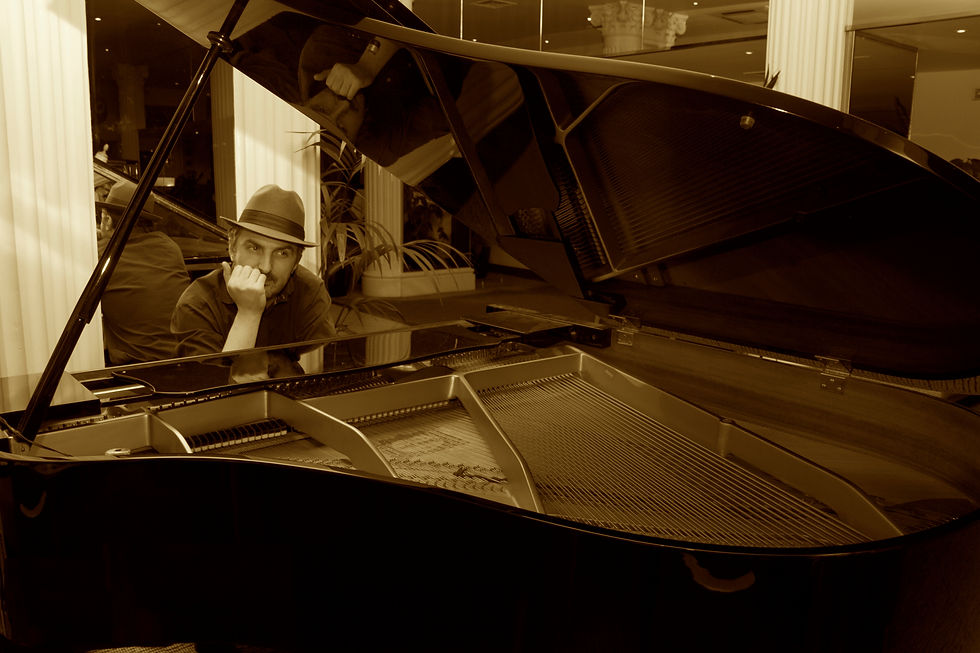“The very embodiment of the term Crooner. Knows his way round the ivories better than most, with an unbeatable repertoire of Classics and originals to keep you entertained."
Island Records artist







BS'D

on Campus
SOURCE FOR THE FULL RABBI LORD SACKS INTERVIEW:
https://rabbisacks.org/archive/behind-the-bima/
QUESTION POSED
"What could the orthodox community spend time on that is being overlooked, apart from more Talmud Torah, chesed, activism, social justice.
Is the orthodox community neglecting anything?"
RABBI LORD SACKS
"After I met Avrom Yoshua Heschel, author of “G-d in search of man”, grandson of the Abter Rov, and a poet of the spirit, not really a philosopher
- I think there are two things we are missing:
• We are missing all that goes with the “affective” dimension of Judaism, the emotional life.
There is some nice Jewish music, but some of the most popular is actually the non-Jewish pop set to Jewish words, sung acappella – which is great, I love it. But I like to see music coming from the Jewish soul. So I think we haven’t done enough with the “affective” dimension. And music is probably the most important, I mean we wrote everyone else’s music, Irving Berlin wrote I’m dreaming of a white Christmas”, Mahler’s 8th symphony is a Catholic mass. Where did we write our music? To tell people what the life of faith actually does to you.
• And the other thing is, and I absolutely think modern orthodoxy is missing out on this badly, is kiruv. And the reason I say this is because the difference between a material and physical possession is, that with a material one the more you share the less you have, when it comes to a spiritual one the opposite. And that is why Chabad can send people out to where there is no Yiddishkeit, where you and I would lose our Yiddishkeit overnight almost, because there is no support system, and yet they keep it, why? Because they’re busy sharing it.
Modern orthodox people should be going out on campuses. Do you know how many Jews we lose on campus, 90% minimum. On every campus you’ll find a nice modern orthodox minyan, davening three times a day, daf yomi, everything la/mahadrin. But they’re not taking it out to people who don’t have it. (and I'd say even harder to do in modern times). And when you don’t give something in your spirit dies."

Based on a combination of these points raised by Rabbi Lord Sacks;
• Where did we write our esthetic music? To tell people what the life of faith actually does to/for you.
• The issue of 90%+ losing Jews on campus, all be it we have a minyan there.
SUGGESTION:
The issue of not having a language represented, by way of a relatable esthetic, is primarily what prevents strides on campus.
This is perhaps what Paper Gun the Operetta was created for. It is for Jew and non-Jew alike – but is a form of Kiruv "the affective dimension, with the emotional esthetic from the Jewish soul" that Rabbi Sacks mentions. Perhaps less subtly so in "All laughs, no smile" (above) with: "whats to/too long for Moshiach" - and "G-d help a broken man" in "Broken man", but conceptually everywhere - all in the audio playlist below.
The Operetta represents a journey from a familiar disappointment in secular paradoxes, where politics is the religion, compromised and non observant - all be religion can have politics the aspiration is to the true golden mean, found only in Talmud study.
Paul also performs his show “the six decades of the Jewish songwriters / Backstage with the tribe” (link below), so his Operetta is a natural extension. Paper Gun's aim is to encourage conversation on the many benefits from a life of Torah observance and learning.
Please email me for booking information

incorporating
"The world would welcome
something like this now
with open arms,
the songs are timeless”.
-Orna Wellman
drama and English teacher, Canada
"Best Piano man I ever heard"
-The Marshes
Savannah
"When you go into the like spoken
word kind of style it sounds a
little bit like Bob Dylan
and David Bowie combined."
-Sound engineer
Fox recital room
Charleston
“I like it how you tell the the history of the songwriters, if they could have given you a review from last night they'd have given you all 10's"
Stanley Baker
President, BSBI synagogue, Charleston SC
“Plus you had that little extra ability to “act” a scenario about the number being sung which contributed tremendously.”
-Len Corbin
Artist management Marbella
"… and the way that you did it!
The way that you just
blended everything…
You were very intriguing it was
more of a show, you know."
-Barman, West Palm Beach, Florida
Country club

“Check this guy out, it’s a kiddush Hashem.”
Ben Shapiro
The Daily Wire
"Out of 400 million people in America; Pinchas Toshner is the only frum baal teshuva from Scotland, singer songwriter.
Uplifting thoughts, could be serious, could be funny, could be both, combined with music. The only musician who can really relate what's in frumkeit to the non religious."
Jacob Applebaum
Lakewood
“In the frum world, we don't often talk about the experience of love. Here, love is explored tastefully. The songs are dense but easy to listen to and that's just from a recording. I imagine there is a special energy listening to it live..”
Daniel Marvin.
Master's in Computers and Information Technology
Baltimore
"I especially like the substantive intellectual meaning that you weave into your music. You remind me of the inspiring Shlomo Carlebach עה”ש.
The interface with the late great Rabbi Sacks (below) is profoundly meaningful."
Rabbi Daniel Lapin



